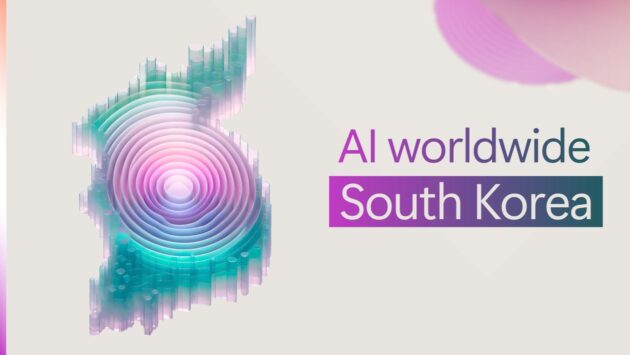
How South Korea is building an AI-powered future for everyone
At the Microsoft AI Tour in Seoul, Korean companies demonstrated how AI is moving beyond efficiency gains to become a true growth engine.

AI is transforming the business world, enabling companies to enhance productivity, streamline operations, and deliver personalized customer experiences. At Microsoft, our mission is to empower every person and every organization on the planet to achieve more, and that means leading this transformation with innovative AI solutions built responsibly that drive real impact in your organization.
Beyond the tools that empower businesses to shape their future with AI in a rapidly evolving market, our leaders at Microsoft are shaping our own organization with this technology. In this series, FYAI, we’ll highlight leaders from around Microsoft that are driving forces in our AI strategy for their unique perspective on our AI transformation; for your AI information, if you will.
In this edition, we hear from Sarah Bird, Microsoft’s Chief Product Officer (CPO) of Responsible AI, ahead of her appearance at South by Southwest (SXSW) where she’ll be discussing the evolving safety practices for generative AI.
In this Q&A session, Sarah shares her insights on various aspects of responsible AI, including her journey and dedication to responsible AI, her role as Chief Product Officer, the importance of integrating responsible AI early in the development process, and her insights on future AI breakthroughs and their safety implications.
Let’s explore Sarah Bird’s experiences and perspectives on the evolving landscape of AI and discover how Microsoft is building trustworthy AI systems.
“For me, it’s less about who influenced me to pursue this career and more about who I’m helping every day through my work. AI is one of the most empowering technologies we have, but we can’t unlock its full potential without solving for responsible AI. That’s what makes this work so important—it’s about ensuring AI is safe and beneficial for everyone. And to do that, we have to work across boundaries. It reminds me of my grad school days—responsible AI is the ultimate group project, bringing together technology, society, and law to tackle these complex challenges in a meaningful way.”
“No two days are the same, and that’s what keeps me energized. At the core, my team is focused on three key things: spotting new risks, figuring out how to tackle them—especially when they’re things we’ve never seen before—and making sure our solutions are scalable so others can apply them easily. That framework guides us, but the reality is, AI is evolving fast. So a big part of our work is staying nimble—triaging issues in real-time, applying what we learn in practice, and adapting quickly to test and deploy new systems. It’s a mix of strategy and problem-solving, which is what makes it exciting.”
“It’s been really inspiring to see how much more mature customers are getting with their responsible AI roadmaps and deployment. There’s real progress happening. That said, people are still learning, and the level of maturity varies across industries—some are further along than others. If there’s one thing I could shout from the rooftops, it’s that responsible AI can’t be an afterthought. It needs to be built into the entire development process from the start, not just bolted on at the end. It’s about putting all the pieces together to create a complete, responsible AI lifecycle.”
“As an engineer, I’m focused on problem-solving rather than predicting when the next big breakthrough will happen. But I will say—it’s an exciting journey, especially with the pace of innovation. And while we still need another major leap before we can talk about the reality of what’s next, what’s really exciting about this space is that the breakthrough isn’t just the technology itself—it’s how we apply it. The real magic happens at the intersection of tech and people, and figuring out how to bridge that responsibly is what makes this work so fascinating.”
“A goal of ours as a company is to help people do more with AI. We are constantly pushing the boundaries of what’s possible and doing so in a safe, trusted way. As I’ve said, safety is not just a ‘nice to have’ bolted on at the end of a project, but a critical piece of developing high-quality AI systems. I look at safety issues as a measure of quality – is your AI performing as well as it should be? We can’t innovate and drive meaningful progress if we don’t solve for this.”

Gain insights from thought leaders at Microsoft to advance AI and drive consistent AI value in your org
At Microsoft, we’re committed to the responsible advancement and use of AI. Our approach is guided by principles that ensure AI development maximizes benefits and minimizes potential harms. We incorporate responsible AI practices from the beginning by training our employees to evaluate risks and collaborating with experts to review and test technologies.
We believe that advancing safe, secure, and trustworthy AI requires a mix of industry commitments, policies, and global governance. Responsible AI is an ongoing journey that involves continuous learning and collaboration.
Sarah Bird is at the forefront of ensuring that AI technologies are developed and deployed responsibly, and her team is dedicated to building tools that test AI systems rigorously to ensure they work as intended and are safe, inclusive, and beneficial for everyone. As she highlights, by integrating responsible AI practices from the start, we can unlock the full potential of AI while maintaining the highest standards of safety and innovation.